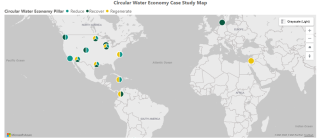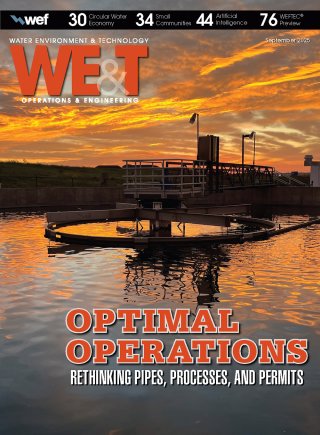Recent and Upcoming Water Reuse Activities
This page highlights recent or upcoming accomplishments and activities relevant to water reuse. Most items on this page are associated with the National Water Reuse Action Plan (WRAP), which is a coordinated and collaborative effort across the water community to advance consideration of reuse to ensure the security, sustainability, and resilience of our nation’s water resources.
Upcoming Reuse Activities and Events
- October 18-22 - 2025 CIFA SRF Workshop: Flow & Harmony: Advancing SRFs Through Community and Innovation. Learn more here.
- October 20, November 5 and November 17 - SRF Office Hours, hosted by the Environmental Finance Center Network. Register here.
- November 12 and December 10 - WIFIA Office Hours. Register here.
- November 20 - Deadline to apply for WRF Project 5367: Data Centers: Understanding Economic Considerations and Opportunities for Water and Wastewater Utilities; and Project 5368: Framework for Assessing Alternative Water Systems: Economic, Environmental, and Social Aspects. Apply here.
Publications, Webinars and Events

The Water Environment Federation (WEF) Releases Interactive Case Study Map
WEF's new interactive map spotlights projects across the globe that support a circular water economy, including several water reuse case studies. Users can explore an ever-expanding index of projects demonstrating WEF's three key circular water management strategies: reduce, recover and regenerate. (Action 4.11: Accelerate the Circular Water Economy Through Innovation)
The EPA Presents Risk-Based Approaches to Water Reuse Treatment in WateReuse Ohio Webinar
In "A Risk-Based Approach to Water Reuse," EPA's Office of Research and Development discussed frameworks to inform microbial and chemical treatment targets for water reuse projects. The presentation focused on how to leverage risk models to enhance treatment system design and assess system performance, drawing on information from the EPA's recent publication: Risk-Based Framework for Developing Microbial Treatment Targets for Water Reuse. (Action 3.1: Compile Existing Fit-for-Purpose Specifications)
NMPWRC Hosts Webinar on Agricultural Reuse of Produced Water
Produced water, generated by oil and gas production operations, can be treated and reused for irrigation, dust suppression and other useful applications. The latest webinar in the New Mexico Produced Water Research Consortium's (NMPWRC) monthly series shared findings from a recent study on the use of treated produced water for agricultural irrigation in the Permian Basin. Presenters discussed produced water treatment processes, soil and crop health impacts, and future research needs. Watch other webinars here. (Action 4.2: Implement NMPWRC)

Latest Issue of Water Environment & Technology (WE&T) Highlights Progress on Produced Water Reuse in Texas
The September 2025 issue of WE&T Operations & Engineering discusses recent regulatory progress in Texas related to produced water reuse. The article also describes New Mexico's approach to using produced water reuse as a resource management strategy.
WEF, Amazon, Water Center at the University of Pennsylvania and Leading Utilities of the World Announce Formation of the Water-AI (Artificial Intelligence) Nexus Center of Excellence
The Water-AI Nexus Center of Excellence will foster collaboration between utilities, industry and academia to address water usage demands from AI infrastructure. This new initiative will also leverage AI to tackle water resource management challenges, aiming to accelerate innovation while ensuring reliable water supplies for communities worldwide.
Water Reuse Funding and Opportunities
The Water Research Foundation Announces $3.4 Million in Funding for 14 Research Projects, including Two Water Reuse Efforts
WRF's Research Priority Program is seeking proposals for 14 new research projects, including two projects to assess alternative water system and data center impacts. "Framework for Assessing Alternative Water Systems: Economic, Environmental, and Social Aspects" (Project 5368) will support research on the effects and feasibility of municipal wastewater reuse, while "Data Centers: Understanding Economic Considerations and Opportunities for Water and Wastewater Utilities" (Project 5367) will explore the economic and infrastructural impacts of data centers. Applications must be submitted by November 20, 2025, at 3:00 p.m. (MT).
Join the Annual State Revolving Fund (SRF) Workshop
The Council of Infrastructure Financing Authorities (CIFA) will host its annual workshop on Clean Water and Drinking Water SRFs from October 18-22, 2025, in New Orleans, LA. This year's workshop, themed "Flow & Harmony: Advancing SRFs Through Community and Innovation," will focus on current and future developments in SRFs. (Action 6.2A: Communicate Eligibility of Water Reuse in SRF Programs)
State Updates
New Law Permits Illinois Water District to Sell Recycled Water
Previously only permitted to sell recycled water and receive wastewater from within Bloomington's city limits, the Bloomington-Normal Water Reclamation District can now sell to and receive from private entities within a 50-mile radius. This law expands opportunities for industrial reuse in Illinois while increasing the reliability of local water supplies.
Texas Passes Bill Creating Credits for Water Conservation and Reuse Projects
Senate Bill 14 of Texas's 89th Legislature requires that developers of projects involving water reuse, conservation or savings be issued credits against water and wastewater impact fees. This new law, effective January 1, 2026, will help make water reuse more economically feasible and drive the development of water conservation projects across the state.
Looking for something?
This page is updated frequently. If you’re looking for previously posted content that is no longer here (e.g., a past webinar, published report), you may be able to find it in our Water Reuse Information Library or Curated Topical Reuse Resources page. The latest entry on the Topical Resources page spotlights onsite non-potable reuse.
Links to websites outside of the EPA website are provided for the convenience of the user. Inclusion of information about a website, an organization, a product, or a service does not represent endorsement or approval by EPA, nor does it represent EPA opinion, policy or guidance unless specifically indicated. EPA does not exercise any editorial control over the information that may be found at any non-EPA website.
